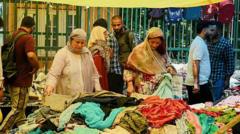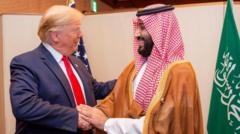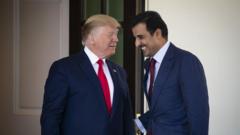Following Trump’s freeze on aid over South Africa's new land laws and the genocide case against Israel, experts warn of potential repercussions for trade relations as the two nations reassess their diplomatic stances.
Tectonic Shifts: South Africa's Relationship with the US at a Critical Juncture

Tectonic Shifts: South Africa's Relationship with the US at a Critical Juncture
Trump's financial aid freeze and contentious land reform policies raise questions about South Africa's future ties with America.
South Africa finds itself navigating a tumultuous relationship with the United States in the wake of President Donald Trump's recent financial aid freeze, a decision he attributes to what he perceives as "unjust and immoral practices" against the white Afrikaner community. The freeze, which amounts to nearly $440 million, is linked to South Africa's new Expropriation Bill that permits land confiscation without compensation in specific scenarios. Trump's sweeping claims include accusations of land confiscation and a disregard for citizens' rights, further straining ties that have fluctuated since the end of apartheid.
Historically, US-South Africa relations have had their ups and downs since the end of white-minority rule in 1994, particularly after the election of Nelson Mandela. However, the latest diplomatic frictions seem more severe and consequential. Trump's executive order, signed last week, follows the signing of the Expropriation Bill by President Cyril Ramaphosa, which has upset the Trump administration. The president's commentary accompanying the freeze also suggested a willingness to assist Afrikaner refugees in relocating to the US, aligning with conservative groups eager to repeal affirmative action laws.
Local analysis indicates that while South Africa enjoys preferential trade status under the Africa Growth and Opportunity Act (Agoa), Trump's decision signals potential changes in how this agreement is administered. Experts fear that South Africa's declining market access could impact its economy significantly, particularly since it generated approximately $2.7 billion in revenue from Agoa in 2023.
Political analysts express that the diplomatic environment is further complicated by South Africa's commitment to its case against Israel in the International Court of Justice. Foreign Minister Ronald Lamola has indicated that the nation will not withdraw its claims, emphasizing its commitment to global principles even amidst economic repercussions.
The situation reflects a larger, unpredictable geopolitical landscape shaped by emerging powers such as China and India seeking to fill potential voids left by strained US relations. South Africa's recent presidency of the G20 presents opportunities for re-engaging global partners, with EU officials affirming their ongoing support despite the rift with the US.
As South Africa embarks on its diplomatic charm offensive, analysts suggest it might leverage its mineral exports as bargaining chips in negotiation with the US. The unfolding debate over the future of Agoa highlights the critical need for strategic policymaking amidst a backdrop of complex international relations, where South Africa's leadership now faces the chess game of its diplomatic future.





















